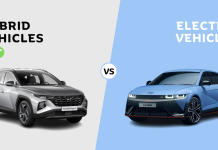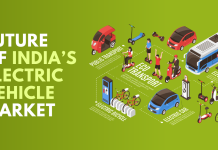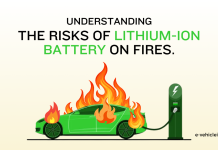 Definitely vehicle scrappage policy is the revolutionary step taken by the Government of India to remove an unfit vehicle from on-road and boost the Electric vehicle sale to control the air pollution level. The automobile sector contributes 7.5% to GDP, this policy will boost the Automobile Sector for Electric Vehicle and it was first announced in Union Budget. Releasing vehicle scrappage policy is the perfect timing and fruitful initiative taken by the Government of India.
Definitely vehicle scrappage policy is the revolutionary step taken by the Government of India to remove an unfit vehicle from on-road and boost the Electric vehicle sale to control the air pollution level. The automobile sector contributes 7.5% to GDP, this policy will boost the Automobile Sector for Electric Vehicle and it was first announced in Union Budget. Releasing vehicle scrappage policy is the perfect timing and fruitful initiative taken by the Government of India.
Now technology is changing, and with the global changing technology- EV is the future. A vehicle becomes aged now release more air pollution and older technology is unsafe with less feature apart from this no. of vehicle should be controlled on road to avoid the traffic problems.
This policy will boost the automobile sector by 30%, scrapping pollutant vehicles offering cash incentives to buy an eco-friendly vehicle. Don’t be an old vehicle rider just scrap the vehicle and be an EV rider star.
Shri Nitin Gadkari had earlier mentioned that the Vehicle Scrappage policy would result in the creation of 35,000 direct jobs and announced an additional investment of Rs 10,000 crore. The vehicle scrappage policy was first proposed by Union Finance Minister Nirmala Sitharaman during Budget Speech 2021 and had a common goal of removing vehicles older than 15-20 years from the roads.
Table of Contents
Timeline For Application of Proposed Scrapping Policy in India
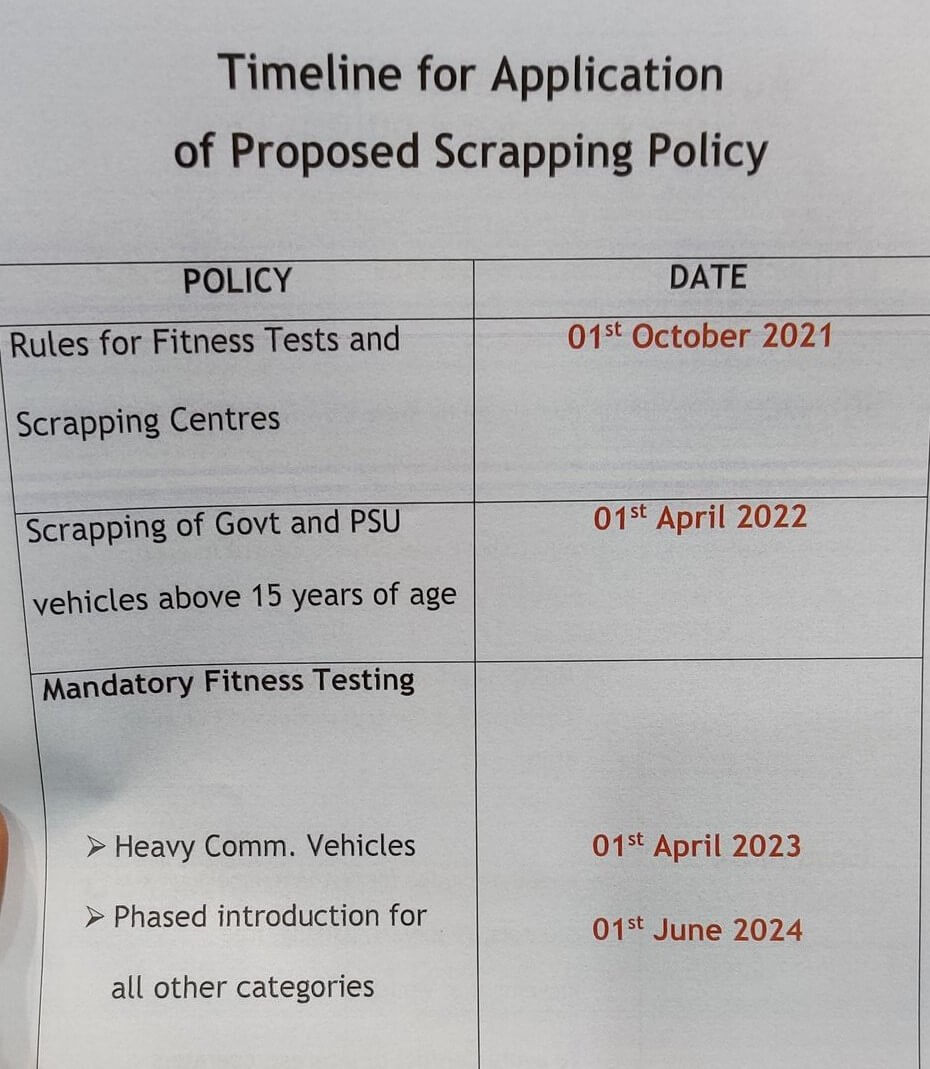
Tentative Timeline for implementation of the Proposed Scrapping Policy:
- The rules of the fitness test and scraping center will be applicable from October 1, 2021.
- Scraping of vehicles of government and public sector undertakings above 15 years of age will be done from April 1, 2022
- Compulsory fitness tests for heavy commercial vehicles will be effective from April 1, 2023.
- Compulsory fitness tests for other categories will come into effect from June 1, 2024, in a phased manner.
Introduction To Vehicle Scrappage Policy
Simply put, commercial vehicles which are more than 15 years old and passenger vehicles which are more than 20 years old will undergo a fitness test as per the Motor Vehicles Act 1989 and if these vehicles fail it will be declared that the life of the vehicle Is finished. The scrappage policy is expected to move towards eco-friendly vehicles, encourage green mobility, reduce dependence on importing oil from other countries and reduce pollution.
Scrappage Vehicle Policy is expected that step towards to environment-friendly vehicle will move, encourage the green mobility, reduce the dependence on the importing oil from other country and reducing pollution. With this policy, the Government of India added a “Green Tax” that people have to pay for renewing private vehicle registration after 15 years.
Indian is quite smart as all we know, rather than paying the green tax they will buy new Electric vehicle because scrapping the vehicle gives incentives to buy new Electric vehicle. India’s automobile industry turnover will reach RS 10 lakh crore from the current RS 4.5 lakh crore and it will create new 35000 jobs in the industry.
As per the policy guidelines, the vehicle has to undergo an automated fitness center as per international standards, and the cost of this test for a car is around Rs 40,000. Investing this amount in a used vehicle is not a good decision considering all. Perspective, instead why not drive electric vehicle with new features and to support the environment, this policy is changing the mindset of the public and Indians always prefer other options so as result this policy will boost in sales of electric vehicles. Electric Vehicles have numerous advantages over ICE engines/Fuel Vehicles.
The certificate from the fitness center is valid for only 5 years after that owner is required to get another certificate, costing is the same. After every 5 years, no one would like to invest such an amount of money, buying a new Electric Vehicle with incentives and no maintenance would be the best choice.
If a vehicle gets failed then according to law, driving the unfit vehicle on road is illegal, so for legal compliance also people’s choice would be buying a new Electric Vehicle, hence the demand for EVs is increasing in a very good manner. India is the largest market of 2 wheelers because of this policy 2 wheeler EV sales are reaching a new milestone.
This policy will come on 1st April 2022, some monetary incentive will offer to the owners who sent their vehicle for scrap, and if a vehicle gets failed thrice then very few choices the will owner have. Indian are attracted to Electric Vehicle already actual before Government of India changes any rule or implement new compliance people are buying new Electric Vehicles.
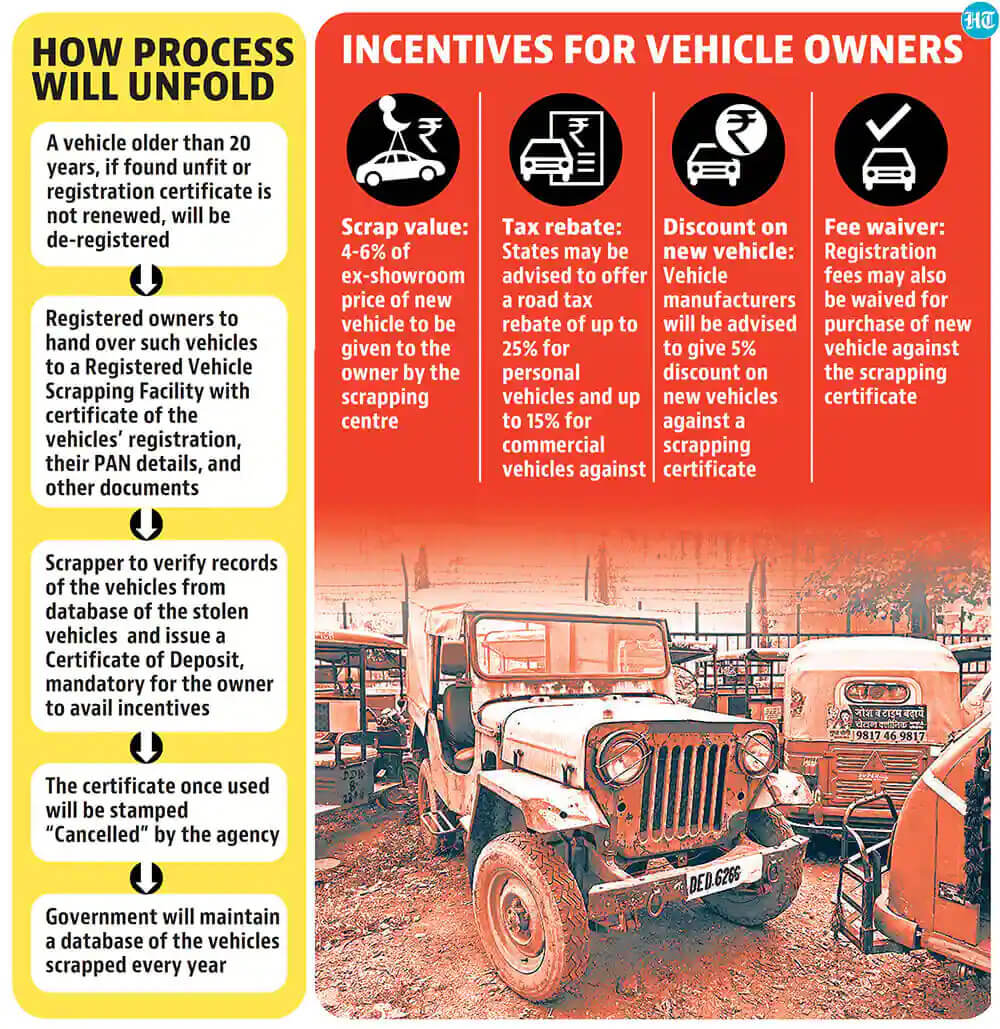
This game-changer policy will including all vehicles of Central Govt., State Govt., Municipal Corporation, Panchayats, State Transport undertaking, public sector undertakings, and autonomous bodies with the union and state government de-registered and scrapped after 15 years from the date of registration. That means Electric vehicles demand is drastically increasing, as Government will use E-Vehicle only. This initiative will increase the sales of electric vehicles in India.
What is Vehicle Scrappage Policy?
Union Road Transport and Highway Minister Nitin Gadkari announced the Vehicle Scrappage policy in Lok Sabha, it is a government-funded program to replace the aged vehicle with Eco-friendly vehicles. The main objective of the policy is to reduce pollution, oil import, with smart and advanced features green mobility (EV) is boosted.
According to the Ministry of Transport, India has 17 lakh medium and heavy commercial vehicles that are more than 15 years old without any valid fitness certificate, 51 lakh light motor vehicles older than 20 years, and 34 lakh light motor vehicles older than 15 years.

In a current scenario, there is around 17 lakh medium and heavy commercial vehicle are older than 15 years and 51 lakh light motor vehicle which are older than 20years have to be scrapped. This policy is “win-win” thing for all of us like it reduce the pollution and improve safety by replaced with Electric Vehicle, boost the availability of low-cost raw material like plastic, steel, aluminum, rubber, electronics, etc.
Vehicle scrappage policy is the substitute to replace the older vehicle technology, the automated fitness center will be issued the Fitness certificate for a vehicle based on this certificate owner will get discount on behalf of scrap value equivalent to 4-6% ex-showroom price.
How does Vehicle Scrappage Policy work?
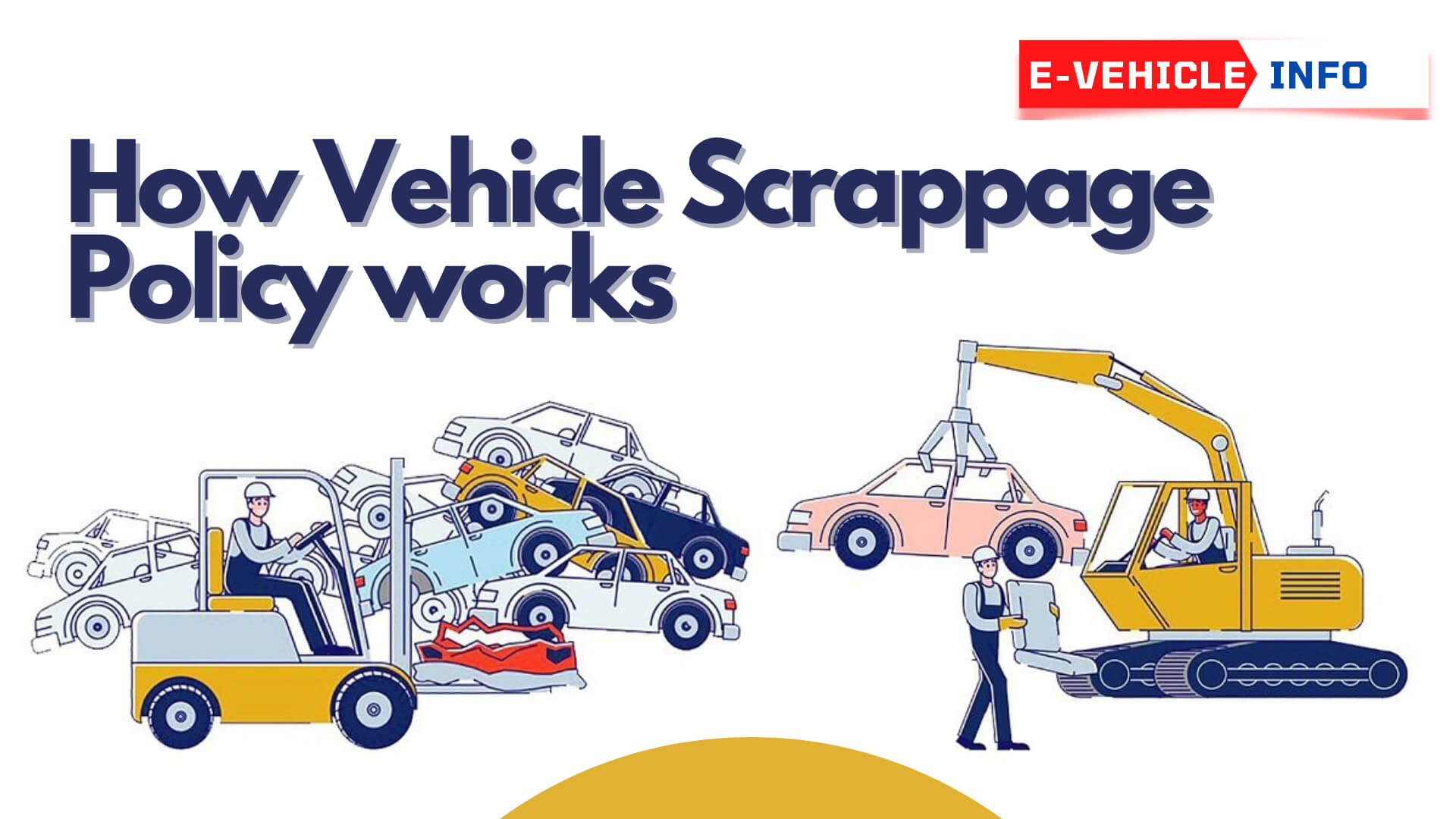 The criteria for scrapping the old vehicle are based on the fitness of the vehicle through Automated Fitness Centers. Currently, there are 7 automated fitness centers and two authorized scrappage centers. The union road and transport ministry setting up of AFC on public and private mode so more actively and the quickly old vehicle will be scrapped. It will lead to the creation of more scrap yards in India and the effective recovery of waste from old vehicles.
The criteria for scrapping the old vehicle are based on the fitness of the vehicle through Automated Fitness Centers. Currently, there are 7 automated fitness centers and two authorized scrappage centers. The union road and transport ministry setting up of AFC on public and private mode so more actively and the quickly old vehicle will be scrapped. It will lead to the creation of more scrap yards in India and the effective recovery of waste from old vehicles.
The registration vehicle scrapping facility shall be provided connectivity and access to the VAHAN database of the vehicle and shall be authorized one who can make entries of the vehicle regarding scrapping.
The Following Vehicles will be Offered for Scrapping Policy:-
- A vehicle that has not renewed its certificate of registration by rule 52 of the CMVR.
- Vehicles that have not been granted a certificate of fitness per Section 62 of the Motor Vehicles Act, 1988.
- The Vehicles that have been damaged due to fire, riot, natural disaster, accident, or any calamity, following which the registered owner self certifies the same as scrap.
- Vehicles that have been declared obsolete or surplus or beyond economic repair by the Central/State Organizations of the government and have been offered for scrapping.
Importance of Vehicle Scrappage Policy in India
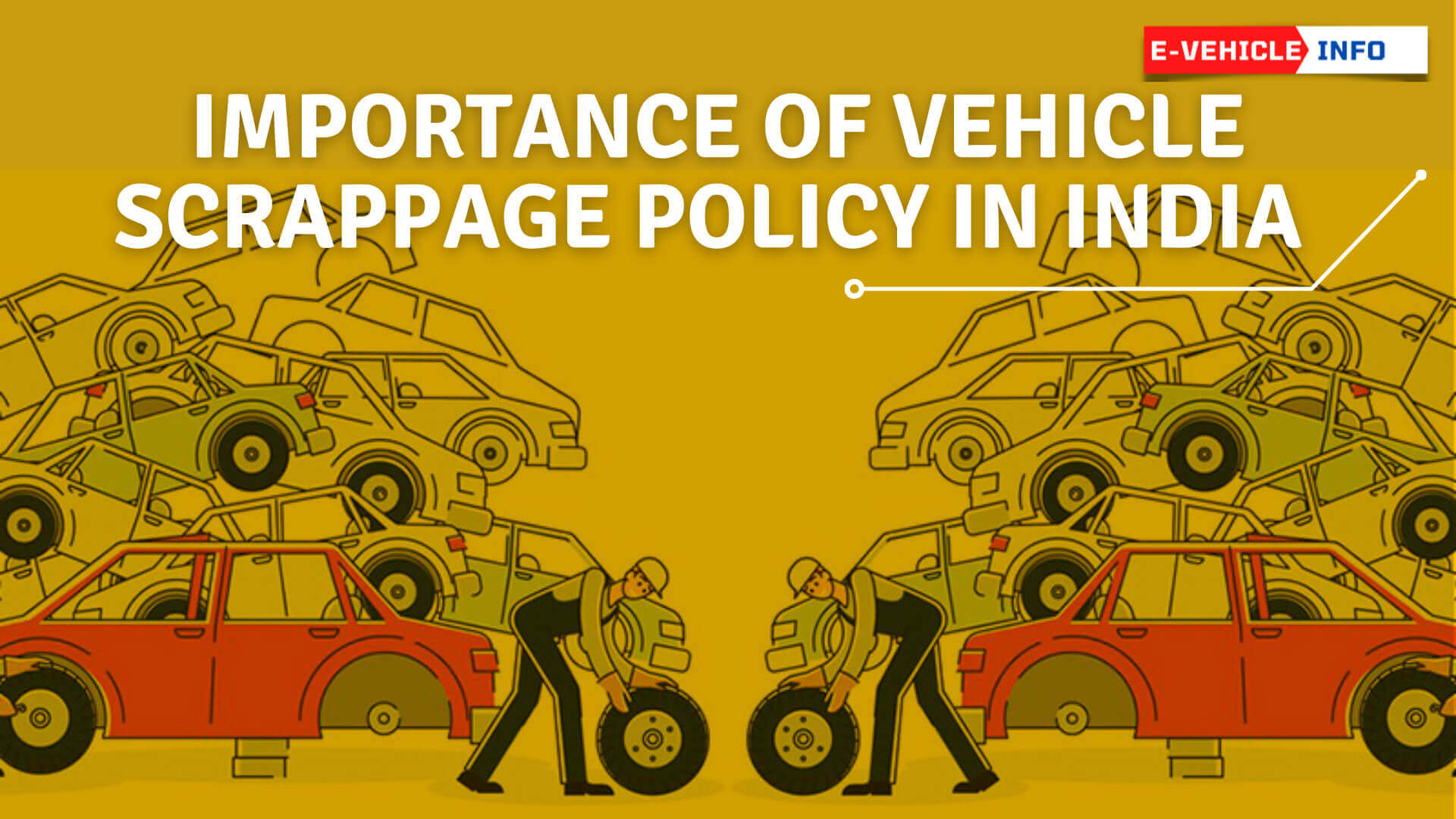 Not only is the scrappage policy in India a very revolutionary move all over the world, and the government of Germany also spent $3.5 billion funds to the program, incentivizing EV owners with a $3320 rebate, the United States Even in cases where the scrappage rate is 5.1%, the government compensates the car dealer for a $4,500 reduction in the price of the new Electric cars.
Not only is the scrappage policy in India a very revolutionary move all over the world, and the government of Germany also spent $3.5 billion funds to the program, incentivizing EV owners with a $3320 rebate, the United States Even in cases where the scrappage rate is 5.1%, the government compensates the car dealer for a $4,500 reduction in the price of the new Electric cars.
The scrappage Vehicle policy will encourage buying more electric vehicles, building more scrap yards and fitness centers with 35000 people who will get employment, and an investment of Rs 10000 crore.
This policy will boost sales of heavy and medium commercial vehicles that had been in the contraction zone as a result of the economic slowdown triggered by the bankruptcy of IL&FS and the Covid-19 pandemic. The government is expecting to get around 30000 to 40000 crores of money through GST.
This will reduce pollution and bring down the prices of auto components drastically with the recycling of metal and plastic parts. As the scrapped material will become cheaper, the production cost of the automakers will also come down.
Proposed Incentives, Disincentives, and Exemptions
Incentives for Scrapping old Vehicles and buying new ones are
- Vehicle manufacturers can give up to a 5% discount for buying new vehicles
- Zero fees on a new registration Vehicle
- Scrap value equivalent of 4-6% of the ex-showroom price of new vehicles
- States can give up to 25% and 15% rebate on road tax for personal and commercial vehicles, respectively
- Reduced maintenance cost and increased savings from fuel
Disincentives for keeping old Vehicles
- States can levy an additional ‘Green Tax’
- Hike in the renewal of registration fee for private vehicles
- Increase in the renewal of fitness certification for commercial vehicles
- Automatic deregistration of unfit vehicles
Vehicles to be exempted from the Vehicle Scrappage Policy
- Strong hybrids and electric vehicles
- Vehicles using alternative fuels such as CNG, ethanol, and LPG
- Farm and agricultural equipment such as tractors, tillers, and harvesters
Benefits of Vehicle Scrappage Policy
- The new charges will kick in from Oct 2021.
- The re-registration fee is proposed to be hiked around 8 times for personal vehicle and around 20 times for commercial vehicle rather than this buying a new EV is beneficial.
- The government of India has issued an advisory to all vehicle manufacturers to offer a 5 % discount while selling a new vehicle against a scrapping certificate.
- The scrap value for an old vehicle given by the scrapping center will be approximately 4-6 % of the ex-showroom price of a new vehicle.
- The state government may be advised to offer a road tax rebate of up to 25 % for a personal vehicle and up to 15% on a commercial vehicle.
- In addition, the registration fees may also be waived for the purchase of a new vehicle against the scrapping certificate.
- Boost the availability of low–cost raw materials for the automotive steel and electronics industry.
Summary
Scrappage policy is a “win-win” situation for the public as well as government, it will reduce pollution and improve safety in the vehicle by replacing it with new Electric Vehicle technology, boost the availability of low-cost raw materials like plastic, steel, aluminum, rubber, electronics, etc.
The government is subsidizing new vehicle purchases to curb high emissions from old fuel vehicles. And the NEMP, FAME-I, FAME-II, and state EV policies are doing the same to promote the sale of electric vehicles to reduce carbon emissions and save the environment. And this could be a new step for India to reduce pollution and move towards sustainable energy.
Indian’s now have a more obvious option to go with electric vehicles as they will now be more affordable to buy for every EV enthusiastic and will be part of making India green.
As older vehicles pollute 10-12 times more and that was older technology so this scrappage policy will reduce pollution plus more benefits as already discussed in this article. An increase in sales of EVs, Creation of scrap yards, employment, improved revenue, reduction in prices all will happens because of the revolutionary step that is Vehicle Scrappage policy.
Read More: Effects of Lithium-ion Batteries on the Environment

